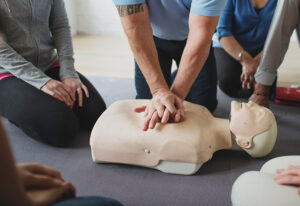Cardiopulmonary Resuscitation (CPR)
CPR (cardiopulmonary resuscitation) is a critical procedure in saving cardiac arrest victims. Whenever sudden cardiac arrest occurs, the victims need assistance within the shortest time possible. If CPR is not provided, fatalities can occur within 4 minutes.
Certain instances might cause a person to stop breathing in which case they are in urgent need for CPR. These include:
- Cardiac arrest
- Suspected sudden infant death syndrome
- Electrocution
- Smoke inhalation
- Drug overdose
- Poisoning
- Suffocation
- Incidents of near drowning
- Road accidents
- Choking
How Does Sudden Cardiac Arrest Occur?
Sudden cardiac arrest occurs unexpectedly. Before experiencing cardiac arrest, some victims exhibit certain symptoms such as shortness of breath, dizziness, feelings of near fainting, unexplained wheezing, irregular heartbeats, palpitations and chest discomfort/chest pain. Sudden cardiac arrest occurs when the electrical systems of the heart malfunction as a result of underlying factors. It could occur from ventricular fibrillation, ventricular tachycardia and bradycardia.
Ventricular fibrillation- is the most severe of all, instead of contracting to pump blood, the ventricles quiver or fibrillate. This condition is critical and requires emergency attention (CPR and AED).
Ventricular tachycardia- is a condition whereby the heartbeat is too fast with over 100 beats per minute, and this condition starts with the lower heart chambers.
Bradycardia- happens when the heart’s rhythm is extremely slow.
South Lyon Fire Department Offers CPR Courses!

